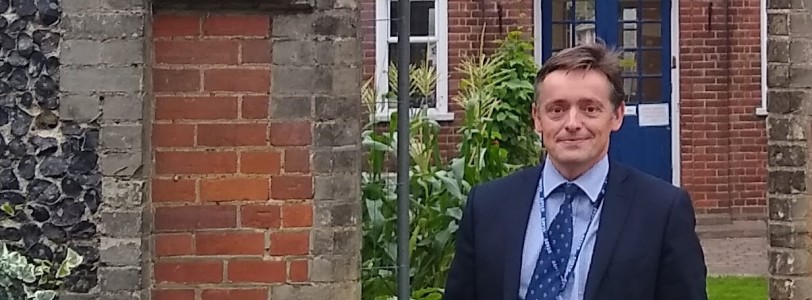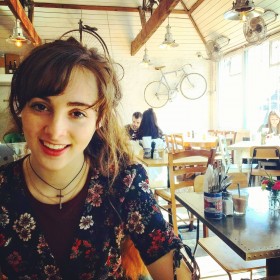What motivated you to become a writer?
When I was teaching, I used to see lots of kids running out of the library at lunchtime having just finished their books. This was in the late 90s, at an all boys school, and they had JK Rowling or Anthony Horowitz sticking out their blazer pocket.
You’ve got to be arrogant to be a writer, and I thought, “I can do that”. So I thought I’d have a crack at it. I worked very hard, researching what type of genre would be the next thing to take off. I don't think it's going to be wizards and spells because that's already been done with Harry Potter. I felt it was supernatural zombies.
I'm not normally a writer of gore, but I had a go at that and I sent off the first draft of The Crypt. Amazingly, the publishers loved it, but said it needed to be a lot gorier. Whilst I wrote The Crypt, I was an English teacher and I’d read the chapters to my class. They were very bright kids of all tastes and interests, all very switched on. They said, “Sir, it needs to be scarier!”
Over a couple of months I re-wrote and sent it back and forth to the publishers. One day I read it back to the class and, this is a true story, there was a complete silence in the room. You could only hear them breathing. “Sir,” one pupil said, “I think you’ve gone too far.”
Boom. I knew it was ready.
When did you know you wanted to become a headteacher?
I was originally in law. I worked for a matrimonial firm in York and wasn't feeling terribly motivated by it, although was training to be a barrister. At school, I was captain of my Debating Society - that was my motivation - so advocacy seemed the natural thing to do. But there was a day at court, during divorce proceedings, that really ceased to motivate me.
As a lawyer I was a bit fed up. One weekend I went back to my parents’ house and told them I wasn’t very happy in my job. My dad said, “Give me one hour in a week when you're most motivated. What is it, and what are you doing?” To this day, I ask myself this if I ever lack drive or direction. In answer to my dad, I said 6pm on a Friday night. Dad laughed of course, and thought I meant when I was at the pub, but Mum knew. Friday nights was when I was a scout leader with the boy cubs.
So after that I decided to become a teacher. You get paid next to no money of course, but to me it’s about the creativity. It’s always been about the creativity rather than the exams.
Why is creative education so vital?
Because it's a human facet. How are humans one of the few species who have survived this long on the planet? No, it’s not because of verbal reasoning or SATs, or the ability to apply logic. No, it’s about the ability to use our creative senses and form sensitivity and problem solving.
Nobody really knows what jobs these kids will do in the 22nd century. Maybe there’ll be a standard national wage? We may be forced to find creative ways to use our leisure time in order to ward off depression and anxiety that will appear after we lose our purpose. This is hypothetical and dramatic of course, but the future is not. When I talk about the 22nd century, it’s already here. At my school, the kids in reception will live to see the 22nd century. The future is here because the kids are here. Computers will always outperform us with maths and arithmetic, but not creativity - not yet, and we need to teach that to the future.
How can schools do more to foster creative education, even if its not in the curriculum?
Model it. As people we need to be creative in our attitude and behaviours, and within character creation. Of course you can teach children artistic skills and problem solving, but in order to unleash your imagination, you need to model it. We model it in the language that we use and the relationships that we build.
I think adding elements of doubt is also very important. We should teach subjects with elements of doubt. I would present a subject in a way where there is a little room for you to doubt. We get told that all the knowledge is already out there, and there’s nothing new for you, so adding doubt makes things unpredictable and exciting.
In a recent article, you said “may we redesign our schooling system so it values creative thinking and innovation as much as literacy and numeracy.” What would be your ideas, given the opportunity to redesign the education system?
It's a slightly Montessorian approach I think. There are natural rhythms to childhood, and although education in theory is simple, the hardest thing is keeping it simple. Children are naturally fitted with the learning skills such as curiosity and creativity, so in essence it’s not complicated.
If I was going to redesign it, I would dispense with the ridiculous notion of a national curriculum. I would still have standards and quality but I would reflect the early years and built it up into secondary school, and upwards. Those long sessions of uninterrupted learning is vital. You start something for the day, rather than going after 40 minutes because the bell’s gone. You've got to go to science even though you were just doing some really amazing work on Churchill, and suddenly you end up in biology. I would dispense with that and instead build on the flow state that we advocate in early years.
How do you manage all facets of your work, such as being a writer, a headteacher, and having a family?
Nobody puts on a gravestone “here lies so-and-so, he wished he'd worked a bit harder and spent less time with his family”. Nobody says that. It's the other way round. I'm only 46 so I'm hoping I've got a lot of time left! When my fourth child turned 10, into double figures, I realised I couldn’t remember much of the past few years.
So how do I balance it all? I guess I'm saying that I want to balance it, but of course there have been some sacrifices. I had this silly thing: I wanted to write 40 books by the time I was 40, and I did, but I don't have the same desire to write 50 books by the time I'm 50. What for?
I don’t watch much TV or play computer games because they bore me. Not in a pious way, but they do. So if you don’t play video games, you think.
Three books to read before 21?
Firstly, a book for thinking would be What does it all Mean by Thomas Nagel. It’s tiny book which is very readable, and within each chapter it has very very big ideas. It’s a philosophy book for people who are new to philosophy.
A book for your imagination would be my favourite story - The Hound of the Baskervilles by Sir Arthur Conan Doyle. It has always been my favourite story, and I still teach it every year in class, selfishly, because I love it so much.
And a book to love? Oliver Jeffers, any of his picture books, but particularly Lost and Found. I can hardly say it without my lip collapsing, I think it’s an amazing book.










Great interview! I wish I had a teacher like that when I was in school.